Adamawa Governor Fintiri set to assent law promoting inclusion of persons with disabilities
By Joseph Adahnu, Yola
As Adamawa State awaits the assent of the state Governor, Ahmadu Umaru Fintiri says all is set to create culture of inclusion and acceptability of persons with disability which scale through first, second and third readings in the State House of Assembly.
The program which was sponsored by the Nigeria Humanitarian Funds (NHF) in collaboration with the United Nation Women (UN) to empower women and girls with disabilities held at the City Hotel Yola in state capital.
In the four day advocacy activity capacity strenghening workshop for a women for Entrepreuers under a project titled “The Employment of Women and Girl with disabilities Towards full and effective participation and gender equality in Adamawa State, with ”activity capacity strenghening workshop for women enterprenures.”
Speaking during the occasion, the Permanent Secretary from the office of Head Civil Service and oversees the Labor and Productivity, Febian Sylvester Wambai spoke on Disability inclusion in workplace at workshop on advancing economic inclusion for Women and Girls with disabilities.
The Commissioner said this was agreed that humanity have the pre-negetive to certain basic rights and privileges, the rights are enshrined in the constitution of democratic Nations of the World, Nigeria inclusive.
He said, according to Section 34 sub-section 1(a) under Foundeemental Human Right stipulates that “No person shall be subject to torture or inhuman or degrading treatment”. Also in the 1999 constitution of the Federal Republic of Nigeria Section 42 (2) provides that “No Citizens of Nigeria shall be subject to any disability or deprivation merely by reason of the circumstances of his birthday”.
He however said, in spite of the above constitutional provision, the physically challenge people are still struggling for inclusion in the Nigeria societies. Bridging the gab between the able persons with disability in Nigeria, Government over the years have made and continue to make concerted efforts through “policies and laws to prohibit discrimination in core race, ethnicity, gender, marital status, age, color and disability.”
He said consequently, to further narrow the gab, inclusiveness was introduced through the discrimination prohibition Act of 2018. It is to as a catalyst that ultimately break all the social barriers and obstacles that are fueling discrimination against people with disability.
The workshop has the support of the National Humanitarian Fund, brought together a wide spectrum of stakeholders including disability rights advocates, women entrepreneurs, civil society organizations, government agencies, and private sector players.
The discussions laid bare the persistent challenges faced by women and girls with disabilities in the state right from discriminatory practices and limited access to financial resources, to infrastructural and policy barriers that restrict their participation in employment, social protection, and procurement opportunities.
This, Stakeholders underscored that despite Nigeria’s ratification of the UN Convention on the Rights of Persons with Disabilities (CRPD) and commitment to the Sustainable Development Goals (SDGs), especially SDG 5 on gender equality, there remains a significant gap between policy and practice at both national and state levels.
The Key themes during the workshop revolved around the need for inclusive employment and access to social protection programs.
Participants pointed out the critical state level challenges including inadequate budget allocations for disability programs, lack of inclusive hiring practices, and digital illiteracy among women with disabilities.
In address these gabs, participants recommended enforcing the 5% employment inclusion policy as outlined in Nigeria’s 2018 Discrimination and Prohibition Act, creating a State Disability Inclusion Task Force, and establishing a Disability Empowerment Fund.
And also a called for the digitalization of vocational training centers and the rollout of community-based sensitization campaigns to combat stigma.
Also other core focus was the structural exclusion of women with disabilities from the public procurement processes.
On this note, it’s becomes a bureaucratic hurdles, low awareness, and limited financial capacity, many women led businesses remain excluded from government contracts.
However, stakeholders proposed series of practical reforms: simplifying procurement documents, providing waivers on registration fees, and reserving a percentage of contracts 10% for goods, 3% for works, and 7% for services for women with disabilities.
During recommendation, they recommend establishing a disability-friendly procurement desk and launching regular sensitization campaigns in collaboration with local governments and organizations of persons with disabilities.
Way forward, the workshop came to conclussiin with a call for Adamawa State Government to the core front and become a national model for disability inclusion. Forther recommendations include the domestication of the 2018 Disability Act, the establishment of a State Disability Commission, dedicated budget allocations for inclusion across all MDAs, and a robust monitoring and evaluation framework to go ensure.
Participants, the workshop draw people from far and near who attended the workshop, out of two hundreds, about forty percent are people with disabilities where they showcase some of their products like shoes for both male and female, Gowns, simple sandals, wears etc.



Comments are closed, but trackbacks and pingbacks are open.